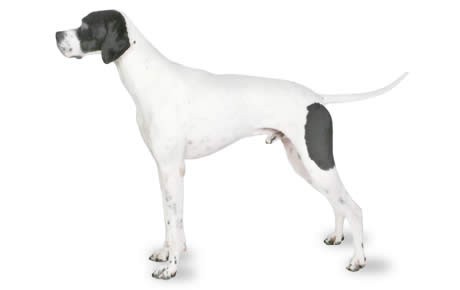Pointer Breed Guide

Breed Group:
Sporting Dogs
Get 30% off
Join our Newsletter
Sign Up Today
Pointer Background Information & History
Originally bred for pointing small animals, the Pointer is a skilled hunter and loving companion. Although their origin is unknown, many historians believe this breed came from Spain but was later brought to England and the Netherlands during the 17th and 18th centuries.
Throughout history, Pointers have been bred with various breeds to acquire favorable traits specifically for hunting. Some of these dogs that contributed to the Pointer’s genetics include Bloodhounds, Greyhounds, and Foxhounds.
These more refined dogs were later brought to the United States most likely with early explorers, but they weren’t documented until the 1800’s. Finally, in 1879, Pointers became a recognized breed by the American Kennel Club.
Pointer Temperament & Personality
Protective, loyal, and independent are the main characteristics of the Pointer breed. These dogs love to be with their family and will repay their loved one’s companionship with security. Pointers are excellent watchdogs and will always alert their family at the first sign of an intruder.
Aside from their protective tendencies, Pointers are courageous and determined, making them an excellent working dog. At the end of the day, this breed’s loving demeanor and friendly attitude pair perfectly with an active household. As long as they get plenty of exercise and attention, this dog will be a man’s best friend for years to come.
Pointer Training Tips
Although this breed is intelligent, they tend to have a playful and stubborn side when it comes time for training. Points need at least an hour of dog training practices every day in order to learn proper pet behavior. Professionals recommend starting this process as young as possible to ensure a well-mannered pooch later on in life. If you are an inexperienced owner or are having trouble training your Pointer, try enrolling them in a puppy obedience class for extra support.
Pointer Exercise Needs
Know before bringing home a Pointer that this breed requires vigorous exercise on a daily basis. Expect to set aside at least an hour a day for walking/running your Pointer. If you are unable to provide your Pointer with this much exercise, then consider adopting a different breed.
Pointers are known to become destructive if they are not given an adequate among of exercise and will also develop behavioral issues. With sufficient exercise and attention, a pointer can be a loving and well-behaved companion for any active households.
Pointer Lifespan
Pointers have an average lifespan of 12 to 14 years.
Pointer Breed Popularity
Although the Pointer remains uncommon within the United States, owners of this breed admire their courageous and hard-working qualities. Today these dogs are ranked as the 117th most popular breed in the U.S. by the American Kennel Club.
Pointer Feeding Requirements
On average, the Pointer should consume between 2 to 3 cups of high-quality food a day, split into two equal meals. However, keep in mind that there are several factors that need to be considered before creating your dog’s specific feeding regimen. These factors include his size, weight, metabolism, and activity level. For further questions regarding your specific dog’s feeding plan, consult with your veterinarian.
Pointer Grooming
For the most part, Pointers are low maintenance when it comes to their grooming practices. A weekly brushing is all that’s needed to mitigate their light to moderate shedding. Aside from that, bathe your Pointer a few times a year to keep his coat in optimal condition.
Just like with all breeds, be sure to brush their teeth once a week to reduce bacteria and tartar from building up. It is also important to check their ears, eyes, and nose for any sign of infection.
Are Pointers Good With Kids?
For the most part, Pointers work well in a household filled with children. However, keep in mind that this breed needs to be trained from a young age in order to learn how to interact with a child.
Pointer Health Problems
Although the Pointer is a fairly healthy breed, they are still prone to several health complications. Possible canine health problems may include:
Epilepsy: Canine epilepsy is the number one cause of seizures in dogs. These seizures can be caused by a number of different factors and range in severity. With proper management and care, a dog can live a happy and long life with this condition.
Cherry eye: Cherry eye in dogs occurs when the gland in a dog’s eye begins to bulge and protrude. While this problem is not life-threatening, it can still cause the dog discomfort.
Cataracts: This condition is a common eye problem that affects many dogs. Cataracts in dogs occur when the lens of the eye turns opaque and foggy, which restricts light from fulling entering. Once this happens, a dog will experience progressive blindness. In severe cases, blindness caused by cataracts can be cured through corrective surgery.
Other Resources
National Breed Website: American Pointer Club, Inc.
Rescue: American Pointer Rescue
